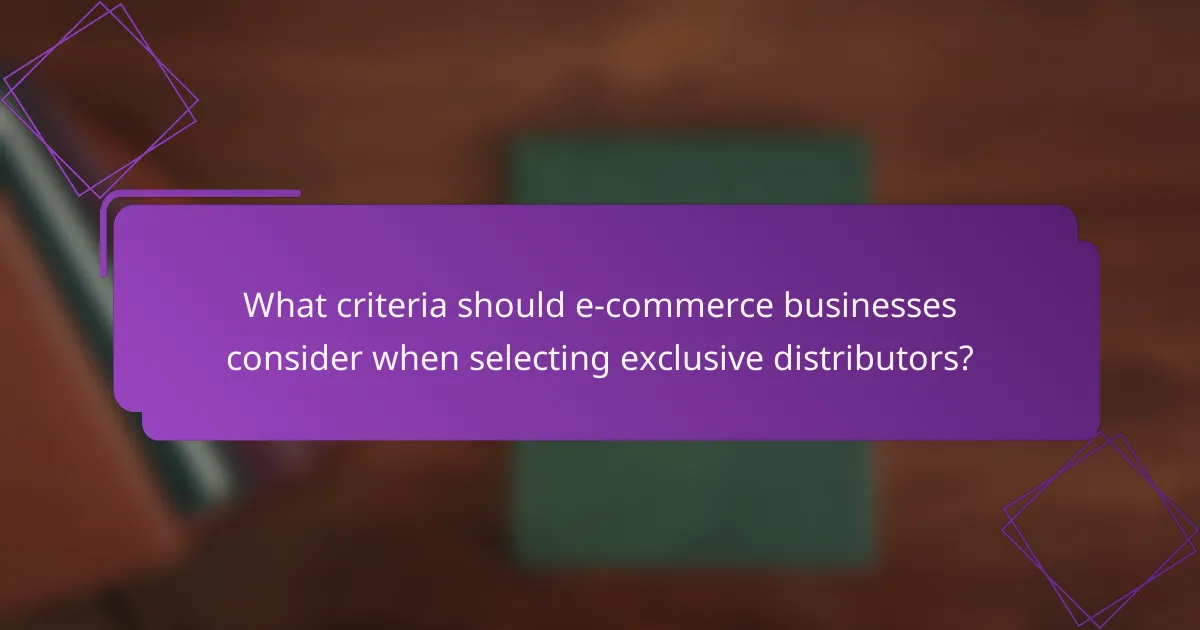Exclusive distribution deals play a crucial role in shaping sales and market reach by limiting competition and enhancing product visibility. By partnering with select distributors, companies can implement focused sales strategies that not only boost market penetration but also foster stronger brand loyalty. However, the terms of these agreements can either restrict or expand a company’s geographical reach, directly impacting sales volume and overall brand presence.

How do exclusive distribution deals impact sales in the US?
Exclusive distribution deals can significantly boost sales in the US by limiting competition and enhancing product visibility. These agreements allow manufacturers to partner with select distributors, creating a focused sales strategy that can lead to increased market penetration.
Increased sales volume
Exclusive distribution often leads to increased sales volume as distributors are motivated to promote products they have exclusive rights to sell. This focused effort can result in better shelf placement, targeted marketing campaigns, and dedicated sales teams, all of which contribute to higher sales figures.
For example, a manufacturer of consumer electronics might partner with a single retailer in a region, allowing that retailer to invest heavily in advertising and promotions for the product. This can lead to a significant uptick in sales compared to a scenario where multiple retailers compete for the same product.
Higher profit margins
With exclusive distribution, companies can often command higher profit margins. By limiting the number of sellers, manufacturers can reduce price competition, allowing them to set higher prices without fear of losing customers to lower-priced alternatives.
Additionally, exclusive deals can reduce costs associated with marketing and logistics, as the focus is on a select few distributors. This streamlined approach can lead to better overall profitability for both the manufacturer and the distributor.
Enhanced brand loyalty
Exclusive distribution deals can enhance brand loyalty by creating a unique shopping experience for consumers. When a brand is only available through specific channels, it can foster a sense of exclusivity and prestige, encouraging customers to remain loyal to that brand.
For instance, luxury brands often use exclusive distribution to maintain their high-end image, ensuring that their products are only available in select boutiques. This strategy not only strengthens customer loyalty but also enhances the perceived value of the brand.

What are the benefits of exclusive distribution deals for e-commerce businesses?
Exclusive distribution deals offer e-commerce businesses several advantages, including enhanced market presence and improved operational efficiency. By partnering with select distributors, companies can focus their efforts on targeted sales strategies and build stronger brand loyalty.
Improved market penetration
Exclusive distribution deals can significantly enhance market penetration by limiting competition in specific regions or channels. This allows e-commerce businesses to establish a strong foothold and build brand recognition among consumers.
For example, a company may choose to work exclusively with a particular online retailer, ensuring that its products are prominently featured and marketed. This focused approach can lead to increased sales and customer loyalty over time.
Streamlined supply chain management
With exclusive distribution agreements, e-commerce businesses can streamline their supply chain management. By working closely with a limited number of distributors, companies can optimize inventory levels and reduce logistical complexities.
This arrangement often leads to better forecasting and inventory turnover, as the distributor becomes more familiar with the brand’s products and demand patterns. Additionally, it can minimize costs associated with shipping and handling, ultimately improving profit margins.
Stronger relationships with retailers
Exclusive distribution deals foster stronger relationships between e-commerce businesses and their retail partners. By committing to a single distributor, companies can invest in joint marketing efforts and promotional campaigns that benefit both parties.
These partnerships often result in better communication and collaboration, allowing for quicker responses to market changes and consumer preferences. Retailers are more likely to prioritize brands that demonstrate commitment and support, leading to enhanced visibility and sales opportunities.

How do exclusive distribution agreements affect market reach?
Exclusive distribution agreements can significantly limit or enhance a company’s market reach depending on the terms and execution. These deals often restrict the geographical areas where products can be sold, influencing both sales volume and brand visibility.
Limited geographical coverage
Exclusive distribution can confine a brand’s availability to specific regions, which may reduce overall market penetration. For example, a company might choose to partner exclusively with a distributor in a particular country, limiting access to potential customers in neighboring areas.
This geographical limitation can lead to missed opportunities in untapped markets. Businesses must weigh the benefits of having a dedicated distributor against the risk of excluding customers in other regions.
Targeted marketing opportunities
On the positive side, exclusive distribution allows for focused marketing strategies tailored to specific demographics. With a single distributor, brands can collaborate on targeted campaigns that resonate with local consumers, enhancing brand loyalty.
For instance, a luxury brand might work closely with an exclusive distributor to create high-end promotional events that attract affluent customers in a particular city. This concentrated effort can lead to higher conversion rates compared to broader marketing strategies.
Access to niche markets
Exclusive distribution can open doors to niche markets that may be overlooked by larger competitors. By partnering with distributors who have established relationships in specialized sectors, companies can effectively reach unique customer bases.
For example, a health supplement brand might enter an exclusive agreement with a distributor specializing in organic products, allowing it to tap into a dedicated audience that prioritizes health and wellness. This strategic alignment can lead to increased sales and brand recognition within that niche.

What criteria should e-commerce businesses consider when selecting exclusive distributors?
When selecting exclusive distributors, e-commerce businesses should prioritize distributor reputation, market knowledge, and logistical capabilities. These factors significantly influence sales performance and market reach, ensuring that the chosen distributor aligns with the business’s goals and customer expectations.
Distributor reputation
The reputation of a distributor can greatly impact an e-commerce business’s brand image and customer trust. A distributor with a strong track record for reliability and quality service can enhance the overall customer experience, leading to increased sales. Researching online reviews, industry awards, and testimonials can provide insights into a distributor’s standing in the market.
Additionally, consider the distributor’s relationships with retailers and other partners. A well-connected distributor may offer better access to key sales channels, which can be crucial for expanding market reach.
Market knowledge
Market knowledge encompasses a distributor’s understanding of local consumer preferences, competitive landscape, and industry trends. A distributor with deep insights into the target market can tailor marketing strategies and product offerings effectively. This knowledge helps in identifying opportunities and mitigating risks associated with market entry.
When evaluating potential distributors, inquire about their experience in the specific market segment and their strategies for addressing local consumer behavior. This can include familiarity with seasonal trends, pricing strategies, and promotional tactics that resonate with the target audience.
Logistical capabilities
Logistical capabilities refer to a distributor’s ability to manage inventory, shipping, and order fulfillment efficiently. A distributor with robust logistics can ensure timely delivery and minimize stockouts, which are critical for maintaining customer satisfaction. Assess their warehousing facilities, transportation options, and technology systems for tracking shipments.
It’s also essential to evaluate their scalability. As your e-commerce business grows, the distributor should be able to adapt to increased demand without compromising service quality. Discussing their capacity to handle fluctuations in order volume can provide clarity on their logistical strengths.

How do exclusive distribution deals compare to non-exclusive agreements?
Exclusive distribution deals grant a single distributor the rights to sell a product within a specific territory, while non-exclusive agreements allow multiple distributors to sell the same product. This distinction significantly impacts sales strategies, market reach, and overall brand positioning.
Market control vs. competition
Exclusive distribution deals provide manufacturers with greater control over their product’s market presence. By limiting the number of distributors, companies can create a more cohesive brand image and maintain higher pricing standards. In contrast, non-exclusive agreements foster competition among distributors, which can lead to lower prices but may dilute brand identity.
For example, a luxury brand may opt for exclusive distribution to ensure that its products are sold in select high-end retailers, reinforcing its premium positioning. On the other hand, a consumer electronics company might choose a non-exclusive model to maximize market penetration and reach a broader audience.
Pricing strategies
Exclusive distribution often allows for more stable pricing strategies, as fewer distributors can lead to less price undercutting. This stability can help maintain profit margins and foster brand loyalty among consumers. Conversely, non-exclusive agreements can lead to price wars, where distributors compete aggressively on price, potentially harming the brand’s perceived value.
For instance, a company selling exclusive high-end watches might set a fixed retail price across all authorized dealers, while a budget electronics brand may allow its distributors to set their own prices, leading to significant variations in the market.
Brand visibility
Exclusive distribution can enhance brand visibility by ensuring that products are showcased in carefully selected retail environments that align with the brand’s image. This focused approach can lead to better marketing support and promotional efforts from the distributor. In contrast, non-exclusive agreements may result in a fragmented brand presence, as products are sold in diverse retail settings with varying levels of promotional commitment.
For example, a high-end fashion label might partner with a single luxury department store to create an exclusive shopping experience, while a mass-market brand might distribute its products through numerous retailers, leading to a less cohesive brand narrative.

What are the risks associated with exclusive distribution deals?
Exclusive distribution deals can pose several risks that may impact a company’s sales and market reach. These risks include dependency on a single distributor, potential market saturation, and loss of pricing flexibility, all of which can affect overall business performance.
Dependency on a single distributor
Relying on one distributor can create significant vulnerabilities for a business. If the distributor faces financial difficulties, changes management, or fails to meet sales targets, the manufacturer may experience a sharp decline in market presence and revenue.
To mitigate this risk, companies should regularly assess the distributor’s performance and market conditions. Establishing contingency plans, such as identifying alternative distributors, can help maintain stability in sales channels.
Potential for market saturation
Exclusive distribution can lead to market saturation if the distributor aggressively pushes the product without considering demand. This oversupply can dilute brand value and lead to price reductions, ultimately harming profitability.
Businesses should monitor sales data and market trends closely. Setting limits on distribution volumes or implementing promotional strategies can help manage saturation and maintain healthy sales levels.
Loss of pricing flexibility
Exclusive distribution agreements often lock manufacturers into fixed pricing structures, limiting their ability to adjust prices in response to market changes. This rigidity can hinder competitiveness, especially in fluctuating markets.
To retain some pricing flexibility, companies can negotiate terms that allow for periodic reviews of pricing strategies based on market conditions. Additionally, exploring tiered pricing models can provide more adaptability while still rewarding the distributor for their efforts.


